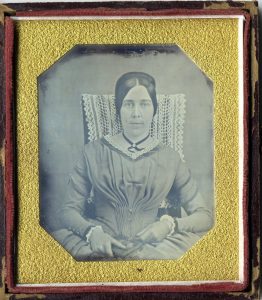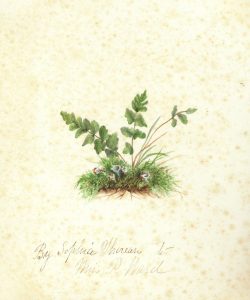
-
- Sophia Thoreau (from Sarah Gertrude Pomeroy’s Little-Known Sisters of Well-Known Men (Boston: D. Estes, 1912)
- Letters of Sophia Thoreau and Daniel Ricketson (from Daniel Ricketson and His Friends: Letters, Poems, Sketches, etc., edited by his daughter and son, Anna and Walton Ricketson (Boston: Houghton, Mifflin, 1902)
- Letters of Sophia Thoreau to Mary Anne Dunbar, typed transcription by Walter Harding (from the Thoreau Society Archives)
Sophia Thoreau
[excerpted from her obituary written by F.B. Sanborn]
The Springfield Republican (10 October 1876)
Thirty-five years ago, there lived in Concord four brothers and sisters, one of whom, a recent graduate of Harvard college, had begun to acquire fame among the transcendentalists and abolitionists by the courage and genius of his writings. John and Henry Thoreau, with their sisters Helen and Sophia,—the last the youngest of the family,—were all teachers, or had been, and all displayed peculiar gifts in that profession. But they were all something more than school-teachers, and, becoming enlisted early in the anti-slavery cause, or in that broader service of humanity which “plain living and high thinking” imply, they gradually withdrew from that occupation, declining the opportunities by which other young persons, situated as they then were, rise to worldly success, and devoting themselves, within limits somewhat narrow, to the pursuit of lofty ideals. The death of Miss Sophia Thoreau on the 7th inst., at Bangor, closes the record of this family,—for she was the last of the four children of John Thoreau and, with the exception of an elderly maiden aunt, the last of the name in America. There are still Thoreaus, it is said, in the island of Jersey, from which her grandfather, John, emigrated to Boston, soon after the Revolution—but there are none in America, except the lady above mentioned. And now the four children lie buried, side by side, at the foot of their parents’ graves in the Concord cemetery, not far from Hawthorne’s last resting place.
The family was a remarkable one, full of talent, rising in one or two of them to genius, and overflowing with affection for each other. . . .
The four children inherited from their mixed ancestry, French, English, New-English, and Scotch, very mixed and lively qualities, as well as serious characters. John Thoreau, the younger, was Henry’s companion in his “Week on the Concord and Merrimac,” and was a youth of remarkable promise, who died early; his sister Helen also died at the age of 37, in 1849—the year Henry Thoreau published his first book. This left the brother and sister, Henry and Sophia,—the younger half of the household,—and from that time they were never long separated till death divided them. Henry had completed his life of solitude at Walden before this, and was again at his father’s house in Concord village,—sallying out from that to make his long excursions by land or water, in many of which his sister accompanied him. Contrary to the common estimate of his character, he was eminently domestic, and when, as a youth, his mother told him,”You may buckle on your knapsack and roam abroad to seek your fortune” Henry shed tears and was unwilling to go away from those he loved. His sister had the same strong affections, and much of Henry’s humor, but she also had a brilliant dramatic wit of her own, which made her one of the most entertaining companions. Since the death of her mother, four or five years since, she has lived chiefly in Maine among her nearest relatives, but away from the scenes with which her dearest memories were associated–the fields and woods of Concord. She has also been a suffering invalid, and for the past two years has been slowly dying, by an incurable disease, the end of which she clearly foresaw. Yet the cheerful temper, mingled with caprices and asperities, which was so marked a trait in Henry Thoreau, was hers also, and she met the approach of death, not only with serenity, but with a laughing mien in the midst of physical torture.
The foundation of the family character was serious, notwithstanding the gayety of their spirits. They all became abolitionists early, and were among the zealous supporters and warm personal friends of Garrison and Phillips, N.P. Rogers, Parker Pillsbury, and the anti-slavery come-outers of 1840. Their house was hospitable to fugitive slaves and to all who loved the good cause of emancipation. John Brown found his way to it in 1857, and, from that time, was an object of admiration to Henry Thoreau and his sister. On the day of Brown’s death, she joined with her brother in the funeral honors paid to him at Concord, and the rose which bloomed in her window, that December day, sent by her to Miss Alcott, brought back the graceful verses which were then read everywhere, though the author had not yet become illustrious. After her brother’s death, two years later, Sophia Thoreau inherited his papers and published many of them in volumes, as he expected her to do. Of late years she has published little, and now has placed the papers in the hands of her brother’s friend Blake, who will print portions of them. Her funeral took place in Concord on Sunday, with rites not unlike those of the Anglican church, of which she, like her ancestors, was a member, though hardly a communicant. In anti-slavery days the church did not stand on the side of freedom, as she thought it should, and she preferred the substance of religion to its forms. But she died in the Christian faith, and was upheld in her last days by that strong consciousness of immortality which was a trait so marked in her brother’s nature.
Death confers a momentary distinction on every son and daughter of Adam. But the claim of Sophia Thoreau to a place in the memory of others rests neither on this, nor alone on her devotion to the poet-naturalist, her brother, of whom she was as much the worthy associate, as Dorothy Wordsworth was of the English poet. This New England household, of which she was a member, had, like some other American families, a distinct and individual existence, in which each person counted for something, and was not a mere drop in the broad water-level that American society tends more and more to become. To meet one of the Thoreaus was not the same as to encounter any other person who might happen to cross your path. Life to them was something more than a parade of pretensions, a conflict of ambitions, or an incessant scramble for the common objects of desire. They were fond of climbing to the hill-top, and could look with a broader and kindlier vision than most of us on the commotions of the plain, and the mists of the valley. Without wealth, or power, or social prominence, they still held a rank of their own, in scrupulous independence and with qualities that put condescension out of the question.


